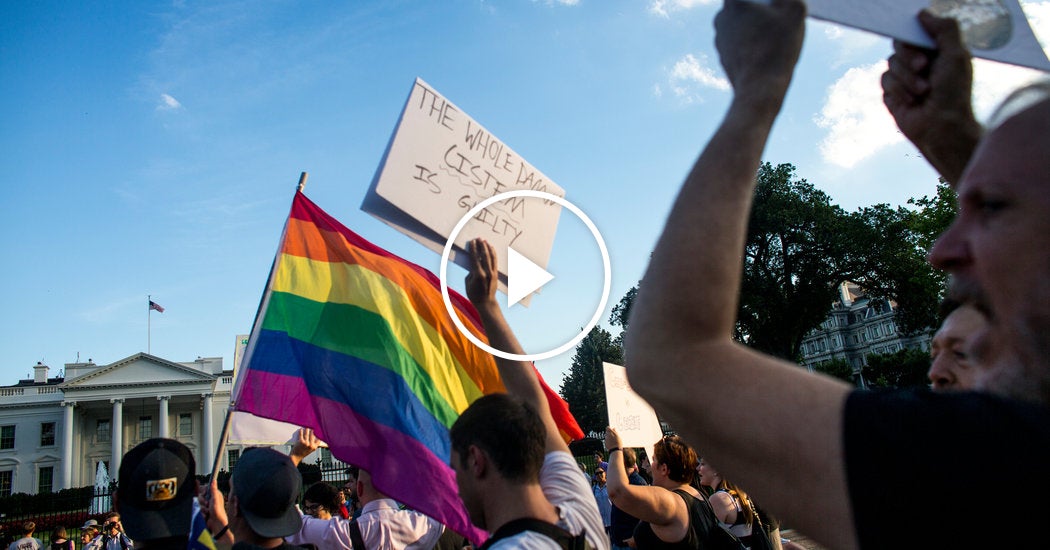Deconstructing The Arguments Around Trump's Transgender Military Ban

Table of Contents
Arguments in Favor of the Ban
Proponents of the Trump transgender policy presented several arguments, often intertwined and sometimes relying on implicit biases. These arguments, while debated extensively, warrant examination to understand the context of the controversy.
Military Readiness and Cohesion
A central argument revolved around the potential disruption to military readiness and unit cohesion. Concerns were raised about the impact of transgender service members' medical transitions on training schedules and operational effectiveness. The cost of medical care for transgender individuals was also cited as a significant factor.
- Increased healthcare costs: The argument suggests that the cost of hormone therapy, surgeries, and related healthcare for transgender service members would place an undue burden on military budgets.
- Disruption of training schedules due to medical transitions: Concerns were voiced about the potential for medical transitions to interrupt training and deployments, reducing overall operational readiness.
- Potential for lowered combat effectiveness: Some argued that gender transition might negatively impact physical capabilities and therefore combat effectiveness, though this claim lacked robust empirical evidence.
- Concerns regarding the impact on unit morale: Proponents of the ban speculated that the presence of transgender individuals might negatively affect unit morale and cohesion, hindering teamwork and trust.
Standards and Physical Fitness
Another core argument focused on the physical demands of military service. The debate centered on whether existing physical fitness standards could accommodate individuals undergoing gender transition. Questions arose about establishing fair and equitable assessment criteria for transgender service members.
- Varying interpretations of physical fitness standards: Different branches of the military have varying physical fitness requirements, leading to difficulties in establishing uniform standards for transgender individuals.
- Challenges in establishing equitable assessment criteria: The debate involved the complex task of determining how to fairly assess the physical fitness of transgender individuals who may be undergoing hormone therapy or have undergone gender confirmation surgeries.
- Debate surrounding the impact of hormone therapy and surgeries on physical capabilities: There was disagreement regarding the extent to which hormone therapy and surgeries might affect physical strength, endurance, and overall capabilities needed for military service.
Legal Interpretation and Executive Authority
Arguments in favor of the ban also touched on legal interpretations and the President's executive authority. Proponents emphasized the President's role in setting military policy, arguing that the ban fell within his lawful authority. However, the ban faced immediate legal challenges.
- The role of executive orders in shaping military policy: The ban was implemented via executive order, raising questions about the extent of presidential power to make such policy changes.
- Constitutional challenges and court decisions: The ban faced numerous lawsuits alleging discrimination and violation of constitutional rights, resulting in ongoing legal battles and court rulings.
- Differing interpretations of relevant laws: Legal experts disagreed on the interpretation of existing laws related to military service and discrimination, leading to protracted legal challenges.
Arguments Against the Ban
Opponents of the transgender military ban presented compelling counterarguments, emphasizing the discriminatory and harmful nature of the policy.
Discrimination and Human Rights
Critics argued the ban was inherently discriminatory, violating fundamental human rights principles of equality and non-discrimination. The policy's negative impact on transgender service members' mental health and well-being was also a significant concern.
- Violation of equal protection under the law: Opponents argued that the ban violated the principle of equal protection under the law, treating transgender individuals differently based on their gender identity.
- Negative psychological consequences for transgender individuals: The ban was criticized for its damaging impact on the mental health and well-being of transgender service members, potentially leading to increased rates of depression, anxiety, and suicide.
- Loss of talented and dedicated service members: The ban resulted in the discharge of qualified and dedicated transgender service members, depriving the military of valuable talent and expertise.
Military Preparedness and Diversity
Contrary to claims of reduced military readiness, opponents argued that inclusivity enhances military preparedness. They emphasized the benefits of diversity and inclusion in fostering a more effective and adaptable fighting force.
- Improved morale and unit cohesion through inclusivity: Studies suggest that inclusive environments promote better morale and unit cohesion, leading to enhanced teamwork and performance.
- Access to a wider pool of qualified candidates: By lifting the ban, the military could gain access to a broader range of qualified candidates, regardless of their gender identity.
- Enhanced understanding of diverse perspectives: A diverse military force brings a variety of perspectives and experiences, potentially leading to more effective strategies and solutions.
Lack of Evidence and Harmful Stereotypes
A crucial criticism highlighted the lack of empirical evidence supporting claims about the negative impacts of transgender service members on military readiness. Opponents argued that the ban was based on outdated stereotypes and prejudices rather than objective data.
- Absence of robust data to support claims of decreased readiness: Critics pointed to the lack of credible evidence demonstrating that transgender individuals pose a significant threat to military readiness.
- Reliance on outdated and biased assumptions about transgender individuals: The ban was criticized for perpetuating outdated and harmful stereotypes about transgender individuals and their capabilities.
- Promotion of harmful stereotypes and discrimination: Opponents argued that the ban reinforced harmful stereotypes and contributed to a climate of discrimination within the military.
Conclusion: Reassessing the Transgender Military Ban and Moving Forward
The debate surrounding the transgender military ban highlights the complex interplay between military readiness, human rights, and policy-making. While proponents raised concerns about costs and potential disruptions, opponents powerfully countered with arguments about discrimination and the benefits of diversity and inclusion. The lack of strong evidence to support claims of reduced readiness further weakens the case for the ban. Moving forward, informed discussions about transgender service in the military must be centered on evidence-based policy-making, a commitment to human rights, and a recognition of the value of diversity and inclusion. We must critically analyze the long-term implications of such policies on transgender inclusion in the armed forces, promoting understanding and respect for all service members. Let's continue the conversation and work towards a more equitable and inclusive military for all.

Featured Posts
-
 Dakota Johnson Channels Spring Elegance With Mom Melanie Griffith
May 10, 2025
Dakota Johnson Channels Spring Elegance With Mom Melanie Griffith
May 10, 2025 -
 Chute Mortelle A Dijon Un Ouvrier Meurt Apres Une Chute Du 4e Etage
May 10, 2025
Chute Mortelle A Dijon Un Ouvrier Meurt Apres Une Chute Du 4e Etage
May 10, 2025 -
 Is Palantirs 30 Drop A Good Time To Invest
May 10, 2025
Is Palantirs 30 Drop A Good Time To Invest
May 10, 2025 -
 Edmonton Oilers Leon Draisaitls Recovery Timeline And Impact On Playoffs
May 10, 2025
Edmonton Oilers Leon Draisaitls Recovery Timeline And Impact On Playoffs
May 10, 2025 -
 Romantiki Komenti Materialists Premiera Me Ntakota Tzonson Pedro Paskal Kai Kris Evans
May 10, 2025
Romantiki Komenti Materialists Premiera Me Ntakota Tzonson Pedro Paskal Kai Kris Evans
May 10, 2025
